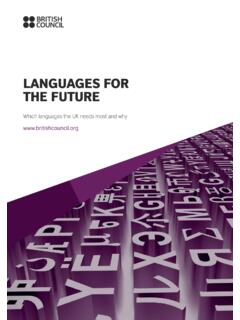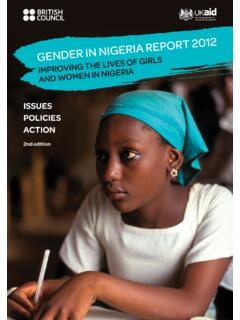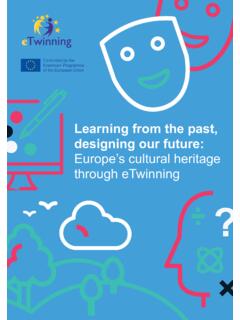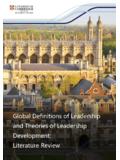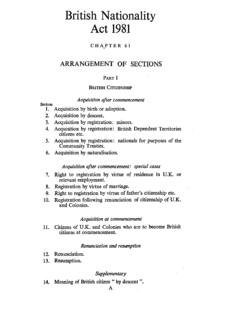Transcription of Soft owe P r Today - British Council | The UK’s ...
1 soft Power TodayMeasuring the Influences and EffectsA study commissioned by the British Council from the University of Edinburgh2 ExEcutEd byThe Institute for International Cultural Relations School of Social and Political Science The University of Edinburgh 22 George Square Edinburgh EH8 9LD, United KingdomAuthors: Professor Singh, Director, Institute for International Cultural Relations Stuart MacDonald, SYM Consulting Assistance from Dr. Byunghwan Son, George Mason University and Graduate Assistants at the University of Edinburgh1 TABLE OF CONTENTS4 Executive Summary6 Part 1 Conceptualising soft Power Outcomes in International Cultural Relations33 Part 2 Measuring soft Power Outcomes in International Cultural Relations61 Resource Bibliography70 Appendices 71 Appendix A Global Approaches to the Practice of soft Power85 Appendix B Multiple regression models with Freedom House Political Rights Index94 Appendix C Data Codebook (containing variable names and data source)
2 2 List of tables, figures and appendicesFIGurEs1A D Relationship between provision of foreign aid and influx of international students, tourists and FDI, and global political Number of Incoming Foreign Students expanded G20 countries3 Relationships Between Causal Factors and International Student Arrivals4 International Tourist Arrivals (Millions)5 Relationship Between Causal Factors and International Tourist Arrivals (Millions)6 FDI Inflows (USD millions)7 Relationship Between Causal Factors and Incoming FDI (Millions)8 UN General Assembly Ideal point Scores9 Relationship Between Causal Factors and UNGA Ideal point ScorestAbLEsTable 1 Data on Causal and Dependent Factors for G20 CountriesTable 2 Times Higher Education 2016.
3 Top Global UniversitiesTable 3 Models of soft Power Influence on Student Attraction (with Polity Democracy Scores)Table 4 Models of soft Power Influence on Tourist Attraction (with Polity Democracy Scores)Table 5 Models of soft Power Influence on FDI Attraction (with Polity Democracy Scores)Table 6 Models of soft Power Influence on UNGA Voting (with Polity Democracy Scores) APPENdIcEsAppendix A Global Approaches to the Practice of soft PowerAppendix B Multiple regression models with Freedom House Political Rights IndexA1 Models of soft Power Influence on Student Attraction (with Freedom House Civil Liberties Scores)A2 Models of soft Power Influence on Tourist Attraction (with Freedom House Civil Liberties Scores)A3 Models of soft Power Influence on FDI Attraction (with Freedom House Civil Liberties Scores)A4 Models of soft Power Influence on UNGA Voting (with Freedom House Civil Liberties Scores)
4 Appendix C Data Codebook (containing variable names and data source3 Conceptualizing soft Power Outcomes in International Cultural Relations4 Executive summary1. soft power, a country s ability to attract and persuade rather than coerce others, is hard to define conceptually and validate empirically. This report addresses these shortcomings. 2. soft power matters. It is an important influence in international relations, global cultures and political economy. 3. soft power encompasses the work of governments and non-governmental actors and citizens and includes economic, political, and cultural institutions and soft power overlaps but is not coterminous with, public diplomacy, cultural diplomacy, and cultural Calculations of soft power assets (or influences) can help to determine outcomes (or attractions))
5 In another set of economic, political and cultural The conceptualisation of influences and attractions moves beyond the weaknesses of past approaches that focused on fuzzy, hard to measure outcomes such as perceptions and understandings, or measurable impacts such as positive media coverage that could not be translated into tangible benefits for the This report proposes a framework that measures the conditions under which a broad set of soft power influences translates into economic, political, and cultural soft power takes place in a fast-changing global context.
6 We need a sharper analytical capability and methodological rigour to inform and underpin soft power strategy development. For example, digital communication media play a role in citizen-to-citizen diplomacy and the changing cultural meanings of diplomacy. 9. This is the first statistical study of soft power across political, cultural and economic dimensions. It finds that many soft power assets or resources are statistically significant in explaining outcomes. These results are borne out through several statistical model specifications, figures, and tables presented in the report.
7 10. Political pluralism is a strong value and exercises institutional pull. High levels of democracy and low levels of political rights restrictions attract international students and tourists, foreign direct investment, and they moderate voting patterns at the United Nations. The latter aspect speaks to the use of soft power in public Provision of foreign aid also has a positive influence on the influx of students, tourist, and FDI, and increases a country s political influence12. Citizen prosperity is attractive. Every 1% increase in per capita incomes acts as a soft power pull factor for anywhere from to increase in international This study measures the strong influence of three cultural factors: cultural institutions, global cultural rankings, and people s Internet connectivity.
8 The following outcomes for cultural variable are important: Cultural institutions such as the British Council or the Goethe Institute are influential for attracting international students, international tourists, and foreign direct investment. For example, a 1% increase in the number of countries a cultural institution from country X covers results in increase in international students for that country on average. A country s cultural ranking in the world also matters for attracting foreign direct investment and for political influence in the world. The overall impact of being in the top 15 culturally ranked countries is important: it translates into moving the ideal point of a country by points.
9 The impact of a high culture rank is higher than any of the factors in the models presented for UN voting. Lastly, higher percentages of populations connected on the Internet lead to higher numbers of international students and tourists, foreign direct investment, and global political influence. Every 1% increase in Internet users from country X also results in almost one-half percent increase in the number of international students for that Pluralist democracies follow a diffused soft power strategy that works its way through various levels and channels, including the activities of national cultural institutions, citizen diplomacy, educational and cultural institutions, and is related to the health of their economies.
10 The literature review shows that top-down soft power strategies of countries like China seem quite attractive. However, our study s quantitative results indicate that China may be an outlier. On average, the causal factors outlined above make a difference in soft power attractions 6 Part 1 Conceptualising soft Power Outcomes in International Cultural Relations7 Introduction What is soft power? It is the ability to get what you want through attraction rather than coercion or payments. It arises from the attractiveness of a country s culture, political ideals, and s. Nye Jr.
